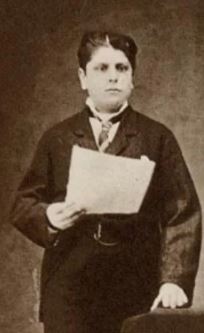Castrato
Castrato refers to a type of classical male singing voice equivalent to that of the female soprano, mezzo-soprano, or contralto. The voice is produced by castration of the singer before puberty, which prevents the boy's larynx from being transformed by the normal physiological events of puberty. As a result, the vocal range of prepubescence (shared by boys and girls) is largely preserved, and combined with the physical lung capacity and matured resonance of an adult, produces a distinctive voice type. The practice was mainly used in the Italian opera in the 17th and 18th centuries.
History[edit | edit source]
The use of castrati in music can be traced back to the early Byzantine era, but it became particularly prominent in the 17th and 18th centuries in Italian opera. The popularity of castrati singers was linked to the demands of the Baroque and early Classical opera for high vocal parts before the advent of female opera singers in leading roles. Castrati roles were characterized by their heroic, romantic, or mythological parts, which required not only exceptional vocal skills but also a strong stage presence.
The most famous castrato of all time was Farinelli, born Carlo Broschi. His extraordinary voice and technical skills brought him international fame, and he became a symbol of the castrato phenomenon in the 18th century. Other notable castrati include Senesino and Caffarelli, who were also celebrated for their vocal abilities and performances in operas by composers such as George Frideric Handel.
Vocal Technique and Range[edit | edit source]
Castrati singers were trained rigorously in vocal technique to exploit their unique vocal range. Their voices were capable of reaching the high notes of a soprano while retaining the power, volume, and timbral richness more typical of male voices. This combination made the castrato voice immensely appealing and versatile for Baroque opera, which demanded both expressive depth and virtuosic agility.
Decline[edit | edit source]
The practice of castrating boys to preserve their singing voices gradually declined in the late 18th and early 19th centuries. Changes in musical tastes, ethical considerations, and the rise of female opera singers in leading roles contributed to the decline. The last known castrato to perform in public was Alessandro Moreschi, who died in 1922. Today, the roles originally written for castrati are usually performed by women or by men singing in falsetto, or by countertenors, male singers who use a special vocal technique to achieve a range similar to that of a castrato.
Legacy[edit | edit source]
The legacy of castrati in music is complex. While their voices were celebrated for their beauty and expressive power, the means by which they were produced involved a practice now considered unethical. Recordings of Alessandro Moreschi, the only castrato to have made recordings, offer a glimpse into the sound of a castrato voice, though by the time of these recordings, Moreschi was past his prime, and recording technology was in its infancy.
The fascination with castrati has persisted in cultural and musical history, inspiring novels, films, and research into the Baroque opera and its performance practice. Their contribution to vocal music and the development of opera remains a significant, if controversial, part of musical history.
Search WikiMD
Ad.Tired of being Overweight? Try W8MD's physician weight loss program.
Semaglutide (Ozempic / Wegovy and Tirzepatide (Mounjaro / Zepbound) available.
Advertise on WikiMD
|
WikiMD's Wellness Encyclopedia |
| Let Food Be Thy Medicine Medicine Thy Food - Hippocrates |
Translate this page: - East Asian
中文,
日本,
한국어,
South Asian
हिन्दी,
தமிழ்,
తెలుగు,
Urdu,
ಕನ್ನಡ,
Southeast Asian
Indonesian,
Vietnamese,
Thai,
မြန်မာဘာသာ,
বাংলা
European
español,
Deutsch,
français,
Greek,
português do Brasil,
polski,
română,
русский,
Nederlands,
norsk,
svenska,
suomi,
Italian
Middle Eastern & African
عربى,
Turkish,
Persian,
Hebrew,
Afrikaans,
isiZulu,
Kiswahili,
Other
Bulgarian,
Hungarian,
Czech,
Swedish,
മലയാളം,
मराठी,
ਪੰਜਾਬੀ,
ગુજરાતી,
Portuguese,
Ukrainian
Medical Disclaimer: WikiMD is not a substitute for professional medical advice. The information on WikiMD is provided as an information resource only, may be incorrect, outdated or misleading, and is not to be used or relied on for any diagnostic or treatment purposes. Please consult your health care provider before making any healthcare decisions or for guidance about a specific medical condition. WikiMD expressly disclaims responsibility, and shall have no liability, for any damages, loss, injury, or liability whatsoever suffered as a result of your reliance on the information contained in this site. By visiting this site you agree to the foregoing terms and conditions, which may from time to time be changed or supplemented by WikiMD. If you do not agree to the foregoing terms and conditions, you should not enter or use this site. See full disclaimer.
Credits:Most images are courtesy of Wikimedia commons, and templates, categories Wikipedia, licensed under CC BY SA or similar.
Contributors: Prab R. Tumpati, MD





